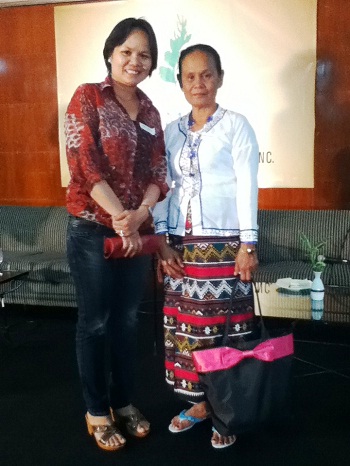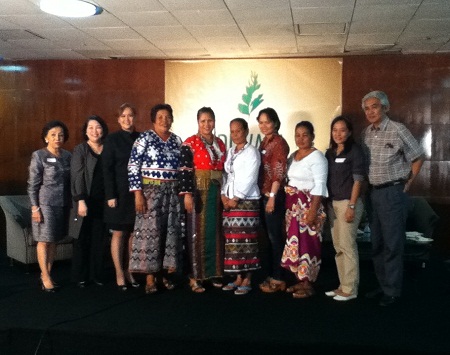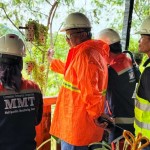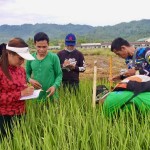Ban prevents company from developing ore body in nearby area at the soonest possible time.
Zenaida Dandana, a Canatuan-based Subanon elder, is now taking it upon herself to speak out publicly in the struggle for continued progress in her tribe’s ancestral domain.
The area’s development is now seriously threatened by the government’s ban on the issuance of new mining permits. The current Canatuan mining operation of TVI Resource Development (Phils.) Inc. (TVIRD) is scheduled to run out of ore at roughly the end of 2013. There is another potential ore body “next door” that could possibly extend the life of the mine (and its benefits) by up to several years – but the ban is preventing the company from pursuing it in time.
Zenaida was recently in Manila to get her message across on behalf of the Subanons in Canatuan. Her mission was to ask President Aquino to lift the moratorium on mining permits at the soonest possible time. Otherwise, it would cast a negative spell for the Indigenous Peoples (IPs)in Canatuan.
|
|
“TVIRD has been a great help to us. They provided us with employment, schools, roads, livelihood, electricity, water system, health care, sent our children to college, and many more. But with the end of the mine’s life by 2013, this will also mean the end of much progress for us,” said the worried Dandana.
Speaking in a forum on Indigenous Peoples and Women in Mining Areas in the Country, Dandana also invited President Aquino to visit Canatuan to see for himself what she was talking about.
Dandana was one as one of the IP panelists in the forum organized by the DIWATA-Women in Resource Development. The organization advocates responsible development of minerals in the country. It hosted the event last August 30 to gather opinions from IPs on mining issues.
|
|
Speaking in the Subanon dialect – but ably interpreted into English by her daughter Gemma, who works as a Forester for TVIRD – Dandana urged the President to lift the moratorium on new mining permits saying that it would adversely affect the Subanon residents and non-IPs as well, in their ancestral domain. While TVIRD is planning to establish an agro-forestry business with the community to promote a sustainable “life after mining”, the community is afraid that they stand to lose jobs, along with livelihood opportunities, social services, public utilities, when TVIRD shuts its Canatuan copper-zinc operations by 2013.
Company geologists estimate that by the end of 2013, mine ores in Canatuan will have been depleted.
Dandana said that the IPs are pinning their hopes in the nearby Malusok area, where a potential ore body was found by the company.
Still on its exploration stage, the process toward full mining operations was discontinued because of the moratorium. “Like what we did before, we gave consent to the company to mine the Canatuan area. We readily gave consent also to explore the Malusok area, hoping that it would further extend the minelife of the company here,” said Dandana.
Malusok is only three kilometers away from Canatuan minepit.
The Subanons own the land where TVIRD operates its copper-zinc mining in Canatuan. This includes the potentially mineral-rich neighboring Malusok area located inside the more than 8,000 hectares Certificate of Ancestral Domain Title (CADT) of the Subanons.
To stress her point, Dandana narrated how life was extremely difficult in Canatuan before TVIRD arrived on the scene. Far-flung and isolated, Canatuan hardly received government services like health care and education. “It took us days of walking just to reach the valleys from the mountains,” added Dandana. Without a road that connected their ancestral domain to the nearest town, the Subanons were effectively isolated, and had to fend off Malaria and other diseases by themselves. They couldn’t send their children to school because of the distance. Worse, the children were often sick owing to malnutrition. They only had meals once a day.
Dandana related that the onslaught of small-scale miners did not help alleviate them from their agony either. Instead, they became slaves in their own homeland.
However, there was a complete turn-around when TVIRD started mining gold and silver, then copper and zinc in Canatuan. “The company built schools, gave access to medical and health care, housing, provided employment, and gave business opportunities. The road they built and maintained greatly helped as we can now sell our farm produce to other places. When it took days to reach Siocon town proper before, it can now be reached in less than two hours. More important, we eat three times a day now,” emphasized Dandana.
“The entry of the mining company has significantly improved our lives and circumstances. All in all, we don’t feel threatened by hardship and ignorance anymore. Surely, we don’t want to go back to the era of poverty and illnesses,” Dandana added.
Dandana has mixed opinions on Executive Order 79. Although she is happy that small-scale miners can no longer come back to destroy the environment, she is disturbed by the moratorium.
Fortunately, Dandana is not alone in her quest. DIWATA is preparing a white paper on the forum that will be submitted to the Office of the President and concerned government agencies. Hopefully, Dandana’s concern will reach the President. Meanwhile, different barangays in Siocon have also issued resolutions asking the President to lift the moratorium on mining permits. Certainly, the people of Siocon, IP or non-IP alike, are beneficiaries of progress and development brought about by responsible mining.





